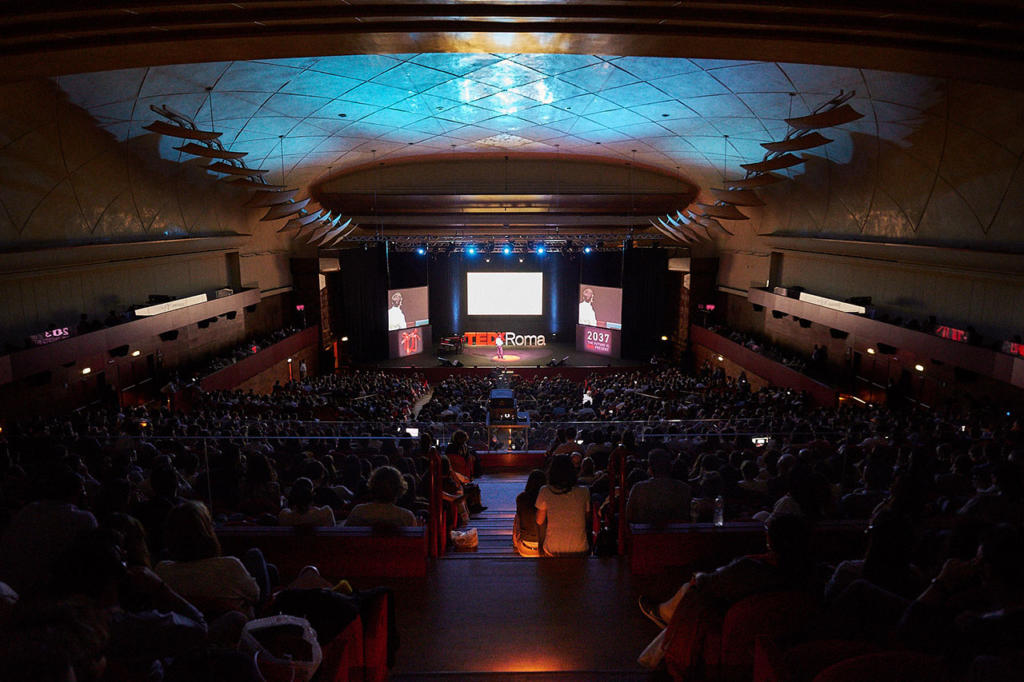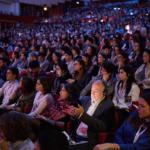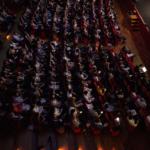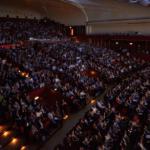 We were at TEDxRoma 2017, I found the spectacular speakers, many interventions from democracy to the cibersecurity. A sold out for a day perfectly organized so many guys from all over the world, it is imagined and tried to talk about our near future the next 20 years.
We were at TEDxRoma 2017, I found the spectacular speakers, many interventions from democracy to the cibersecurity. A sold out for a day perfectly organized so many guys from all over the world, it is imagined and tried to talk about our near future the next 20 years.
I would say today is 2037, so the talk time is needed. We can already see this future with our current choices, depends on us our future, we will have to give the reasons and the goals of those choices. Speakers have addressed outstanding issues from ‘ethical progress, the frontier technologies, on the meaning of democracy, dignity and disclosure, economy, frontier medicine. Cues to look forward to give mankind a better perspective.
I interview the curator of TEDXROMA, Emilia Garito – computer engineer – CEO of Quantum Leap – Ideas for Sale – leading company in Italy in consulting in Technology Transfer, Patent Brokerage and Open Innovation, as well as IBM’s Watson AI XPrize Ambassador. For the past four years he has enthusiastically dedicated to creating a great TEDxRoma community.
Interview with Emilia Garito, curator of TEDXROME
 1) We talk how did comes this curating TEDxRome 2017?
1) We talk how did comes this curating TEDxRome 2017?
This year we wanted to focus on a feeling and a common demand in any contemporary society, namely the need to imagine a future that can put in the middle of the choices humans. And ‘This was the event TEDxRoma ethics of progress and for this reason we wanted to talk about the near future, not too far, that turn our gaze with more responsibility.
Of course, today and ‘really hard to predict the future, but our conclusion is that perhaps we can analyze this and understand what our tendencies and, most importantly, where our hopes should be pinned.
2) The philosophy of TEDx in three expressions?
Multidisciplinary of subjects treated with honesty and competence, proposed by different people from different cultures.
Inclusion, sharing, freedom and authenticity are key ingredients to be able to intercept and disclose the ideas worth spreading.
TEDx is like a movement of people that you meet, physically and virtually, on topics and visions, and thanks to which generated energy is a positive phenomenon and proactivity contagious, even when different opinions do not converge; as the inspiration is to respect the ideas of others, and through it to find if possible even more right solutions and visions.
3) These four years TEDx what they bring you? What would you change and what would you leave?
They bring experience of course, knowledge, understanding of its limitations and constantly work on themselves and the project still growing. At this point I would not change anything, but it would work even better on what we have achieved together with an already solid team. We’ve seen and spent together, but I think that the future will see us definitely involved in taking care of our community, perhaps through the creation of intermediate events and smaller, and in offering content increasingly focused on stimulating a positive conversation about different themes.
 4) Our current choices, the new frontiers, how can they influence the 2037?
4) Our current choices, the new frontiers, how can they influence the 2037?
People often think that the future is inevitable and that above all it is inevitable taking it, or at least live it passively.
I believe that a greater awareness of what we are using right now, of how and why we are doing, is critical to guide the choices of those who have the power to apply the technology and progress also to economic interests. In the last 20 years I think it was too biased the choice of using certain technologies not always to improve our lives and or finding solutions to problems, rather towards the creation of new business models that were financially attractive. This certainly can not forget the great step forward made in medicine and science in general, but the point is that we as a society we are still performed often to be produced and not a user of many apparent very trendy facilities, often unaware of as the economic models that have followed in part have led to major social inequalities and serious problems.
If we think, therefore, the impact that the new frontier technologies could have on our daily lives, and I think, therefore, artificial intelligence, it is easy to imagine how the progress of the next 20 years could bring more imbalances that are increasingly convinced, it touches a little ‘to all of us cope with the expertise, participation in a global discussion and especially considering ourselves very active part of the process of building our future.
Promote therefore an open debate on the ethics of progress, and also on economic and social issues on a global scale, I think it is an important step to creating the conditions necessary awareness in building our tomorrow and guide current choices towards an end, perhaps ambitious, but surely must, by mutual improvement and sustainable growth for our entire society.
5) This year the choice of thematic, how and why?
We started from the concept of “porous borders” of the first session, to indicate how the transition between the two eras in which we are now and in the border between the different cultures and society , in the middle between the traditions and the new requirements, there is now the porosity’ understood as a place of contamination in which the different elements are to coexist and from whose interaction depend on the most ‘virtuous solutions. A place, therefore, in which to observe the present and plan for the future so as to include the demand for change and respect diversity. In this session we talked of our cities’ future, the possible energy systems, as we will imagine new professions and how they’ll do to the feeding of our people and their coexistence.
The second session, told the phenomenon of “floating worlds”, those new worlds than in the past are losing firm points of reference, and they are there to generate new reality in which up to us to build the pillars of the future. Technology and medicine, computer science and robotics, creativity ‘and the new economy, are today more and more’ interconnected and this new dimension of encounter and confrontation between the different disciplines and ‘the basis of the future that we will live through a completely new paradigm. The multidisciplinary approach is thus find new frontiers, especially to understand and to manage.
In the third session, we have dealt with the subject of society and democracy of tomorrow. We called it “Utopia of a positive future”, to evoke a message of hope that fully came to our audience. The reference is obvious, and wanted, to that beautiful utopia Plato advocated in his vision of Zeus time thinking of a humanity ‘with freedom’ and capacity ‘, but at the same time he was afraid thinking about the potential disastrous consequences that too much freedom ‘, and therefore democracy, they would have generated if not solidly supported by the expertise and honesty’.
I can say that in a very personal way inspired me this issue is the fact that it is now widely thought that democracy, as we know, has come to its end. It appears that since the models represented here have failed. The era of digital communication has transformed creating great opportunities and respecting individual thinking, but also amplified the noise generated by the incompetence or simply superficiality.
It would be interesting to understand how much of this has really influenced our present and how, on that basis, we could imagine a future that is ethical, inclusive and therefore positive and based on the principles of truth and meritocracy, as Plato wished. However, I do not think it’s possible to have an answer on this, and perhaps it is not necessary. Perhaps the only real chance is to look back and rethink the concept of democracy and its significance. This was the end of the session in which they talked about different points of view, friendship, past and future, to conclude with the Zimbardo message that encourages the creation of a society of young super heroes every day. We should all learn to repeat: “I am an everyday hero every day.”
6) Cibersecurity speak, one of the topics, the approach very exciting. We are increasingly linked to cybernetics, because you have to protect themselves, and why?
And ‘in fact the instrument of silent war, already in progress, very underestimated, but that scares impotent governments across the unpredictability and the speed with which the hacking techniques are spreading. I personally believe, and hope, that the various governments will implement the Defense systems in fast times to fill the gap that now separates them from those who already is implementing cyber attacks. It ‘a priority and an issue on which we must act quickly, it is not a political issue, it is much more, is the issue of national security for each country.
7) The technology as it affects our lives, and how it always will be in the future?
It depends on which technology, but in any case a bit ‘will be permeating all of our future behavioral patterns. That’s why right now in our time it is necessary to have greater awareness. The SW will be increasingly invasive and determine new professional scenarios. Many jobs will be lost, and other professions should be created. But despite the numbers today, and assumed the most reliable predictions, it is difficult to predict the adaptability of the population to a sea change so radical and fast. There is talk of creativity as an alternative to professional works based on technique, perfectly replicated by machines, but the question I ask myself is, even assuming that the new company may be able to become more creative and build professional bid based on creativity very abundant and versatile as never seen before in history, how can we build an application that can deprive the offer? In essence, what will be the economic model that can make less extensive as possible the gap between supply and demand in the new world of work, and especially that it is not too much to the disadvantage of the second? And ‘perhaps appropriate to slow down a little’ progress pending the achievement of a more equitable balance? I leave it to the economists the tough response.
8) Ethics and technology such close connection?
It is said that sometimes the end justifies the means. This is even more true when the end is the Ethics and technology is the tool that allows the full achievement of this goal. For me it may not be worth the contrary, teaches philosophy, the history attests, it now takes more than ever our planet.
9) What do you want to convey to the public of TEDx? Young people but also many adults?
The sense of the opportunity to do things you believe in. The message of the importance of the intellectual exchange across borders. The desire to meet one another within the community and to create value together around each, overcoming barriers and prejudices.
10) What argument not treated she would like to come out?
Intercultural communication. His methods and impacts that may be generated through the different languages and communication models. It fascinates me to think that there may be understanding and affinity between apparently distant people who actually found as the only barrier between them other than the language of communication. And while the idea that people who share the same language and communication that belong to the same culture can’t understand instead. Language is the SW of the contemporary population, that through which they travel messages, data and insights. I think that often we all live in an unnecessary misunderstanding and would love to explore new avenues and tools
11) What would you do in the future? Projects?
I’m already doing in different types and sizes. But let me make one, just one, who has the advantage of creating an ecosystem functioning in our country in a specific and strategic sector for the growth of the chosen field, which for me remains to be Technological Innovation.
I believe in the great potential of Italy inventive, thanks to the National Research appreciated all over the world and I think that, again in an ethical sense, the top goal of our country should be the development and growth of its scientific and technological excellence. I see everyday opportunities that clash against the absence of a proper promotion system, although much progress has been made. The first project that would put in place is to start creating a widespread awareness of the technological excellence of our country; we can’t consider ourselves first Italian to have as strengths tourism, fashion and food, when we instead one of the first countries in the world for scientific publication number. You have to completely change the perception of our country to our inside and outside, if we want to start from our true DNA and enhance it to the fullest.
12) to end, I would give as vote 10/10 for the project TEDxRome 2017, what is your vote from the inside, where vision is increasingly difficult?
This year, without false modesty, given the commitment and work limitations imposed by the fact of being a volunteer and then TEDxrs, I rate 9/10. For the energy and sense of positive that our speakers have left our community and to all of us of the TEDxRoma Team.
TED is a nonprofit devoted to “Ideas Worth Spreading”. The goal of TED is to spread ideas that have value and this is the spirit that animated the first TED conference in 1984, which lasted four days and whose main purpose was to bring together people from three worlds: Technology, Entertainment Design. Since then, his horizons have expanded more and more. During the annual conference – the ‘TED Conference’ held every year in Vancouver, British Columbia, – the speakers are invited to talk about their ideas and insights, through speeches and presentations of up to 18 minutes. These tales of thoughts, ideas, actions, food for thought, action and imagination are collected on www.ted.com site and made available to web users.
She is an independent curator, art advisor and international marketing management consultant. For more than 20 years, he has been a cultural designer of events related to contemporary art with particular attention to unusual spaces and interactions with other arts.



